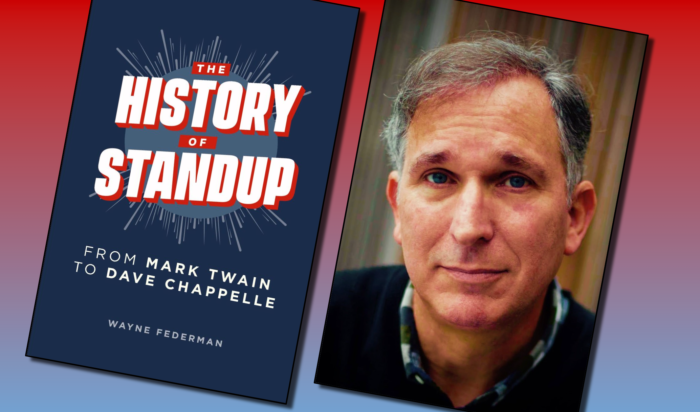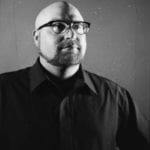
From the podcast to the book, Wayne Federman chronicles the business of joke-telling.
It’s fortuitous that I would speak with comedian Wayne Federman about his new book. The night before our chat, when I received an email from his publicist, I was watching the Adam Sandler movie Funny People, and there’s one scene where, for less than a minute, Wayne pops up and I immediately thought, Oh hey! Wayne Federman.
It’s as if I manifested this conversation to happen in a bizarre, Beetjuice comedy-interview kind of way.
Wayne is a 35-year veteran of standup, best known for the documentary I Am Road Comic, his Comedy Central special, and dozens of short appearances on movies and TV. In fact, many are so short he even dubbed his patented one scene-and-out career move the “Federman.”
In addition to his work as a performer, he also teaches standup history and performance at the University of Southern California. But here, instead of having to shell out $58,000 tuition to enroll in his class, you can learn about the evolution of jokes, from Vaudeville to Lincoln Financial Field, from the man compiling the tome himself.
You’re credited with more than 90 TV and movie appearances. Are there any of those cameos or small roles that you just completely have forgotten that you were even in until someone reminds you of it?
Not really. I sort of remember every, ’cause that’s the whole goal of my life was to do these kinds of jobs. Not only do I remember them, I remember what I was feeling when I was driving to the set. I remember them all, even Baywatch.
As someone who has written for awards shows, what’s the difference between writing for those and writing as a monologue writer on Jimmy Fallon?
Writing for late-night is a Groundhog Day job. You wake up, ring, “I Got You, Babe” comes on the radio and you’re like, I just did this job yesterday. Ring, I just did … It’s the same job every day. It’s a grind. Whereas writing for an award show, it’s like, Oh, you’re doing all this work focused on one day in the future. And then when it’s done, it’s over and then you drink at the afterparty. And you’re done.
When it comes to hiring comedians for writing for late night, what exactly are you looking for in a submission packet or in the outside world?
It’s very simple: good punchlines. Everything else is not important. Every joke is a misdirect. Like we think you’re talking about one thing, but you’re talking about something else, or you’re taking two ideas and you’re putting them together. But if somebody has a punchline that catches my eye and I’m like, Oh, this is making me laugh. I didn’t see this coming. That is a smart take on it. That’s all it is. It’s really a tough job, but it takes a specific kind of person. And I only lasted a year in that job.
I was once writing jokes for a show called Politically Incorrect. There was a guy, Chris Case, and Bill Maher was like, “Can we please have a joke about Bill Clinton in Ireland? How hard is that? Ireland. Drinking. Come on!” We closed the door. It’s just the two of us. And I’m frozen with fear. And Chris is [typing sound]. Which was making it impossible for me to write. And within 10 minutes he had about eight jokes. And it was like, Oh my God, this guy is a machine.
As someone who has worked in the late-night TV show realm, as a comedy historian, and also as someone who has performed on late night as a comedian, do you think the Tonight Show still launches careers the way it did in the past?
A lot of people did the Tonight Show with Johnny Carson whose careers were not launched. That’s a common myth that I talk about in the book that, yes, there was Roseanne and Garry Shandling and Seinfeld, and obviously Freddie Prinze, but there were dozens of comedians that would do the show multiple times that didn’t break through at all. And just doing the Tonight Show became a great thing for your family and friends, it’s a bucket list accomplishment, but just ultimately a wonderful line in your introduction.
It could launch your career, but not as much as it did during the days of Johnny Carson.
Do you think that there are more advantageous platforms and outlets for comedians?
Oh my God. Are you kidding me? Yeah, of course. Look what happened over the pandemic. Look, look at two people. Ziwe had an interview show on Instagram live. She now has a Showtime variety show that she’s hosting. And obviously, Sarah Cooper did a lip-sync into her phone, and then next thing you know, she has not only a Netflix special but a CBS sitcom pilot as well. It’s just been greenlit. So that’s as powerful as anything that’s happened with Johnny Carson.
As someone who is a comedian, a comedy teacher at a university, a comedy writer, and a comedy historian, is this new wave of PC culture any more real than compared to any other era of comedy?
No, no, no, look, look, it’s definitely a real thing. There’s just no doubt about it. There are people that are super sensitive about certain words or certain subject matters, and they will come after you and try to destroy your career if they can. That is for real, I’ve seen it happen. But my feeling about this whole thing is like, it’s terrible. I feel like it’s anti-comedy. It’s anti-free speech, but it’s like an annoyance. It’s not going to kill comedy. It might slightly adjust it a little bit, but it’s just not going to kill it. Comedy is too strong … it’s like an annoyance as opposed to the roadblock.
You’re currently working on a documentary about George Carlin, who is an incredibly famous voice for both free speech and riling up against the system and riling up against pop culture. As someone who by now probably knows a lot about George Carlin, where do you think Carlin would be on today’s PC and cancel culture?
This debate was happening in the ’90s as well. And so Carlin was alive, he died in 2008. So he talked about it quite a bit and he was like me, a big believer in, it’s not the word, it’s the intent. It’s the intent behind the word. Like, if you can show someone is a horrible racist using these words. And then you’re like, Oh, okay. I understand that. But he said that political correctness is especially insidious because it comes under the guise of tolerance. It comes under the guise of, We’re just trying to make this a nicer thing. But what you’re really doing is you are controlling how other people speak. You are being authoritarian in that regard. So I think he would be obviously horrified at anyone who was a racist. And he dealt with those people all the time. I think at his core, he was all about words. That guy was all about the language, and he hated the euphemisms. He hated the people who use the language to disguise and create a different world. I would never, ever be so bold to speak on behalf of what I think George Carlin might say, but I can tell you what he did say under similar circumstances.
On your podcast, The History of Standup, you went into deep dives into Nerd Melt, the Chicago scene, and the Chitlin Circuit. What I was waiting to hear was the Boston/New England comedy scene, and I never got it. Are we going to see a chapter in the book dedicated to Boston?
No. I mean, I mentioned it, I say that San Francisco and Boston were the two biggest, outside of New York and LA, comedy hubs during the comedy boom for a number of reasons. I just feel like there’s an incredible documentary called When Stand Up Stood Out that tells the story better than I can.
For other fans of the podcast, what is in the book we didn’t hear on the podcast?
In the podcast we didn’t really talk about Artemis Ward, we really didn’t go into the nightclub era much, or the Catskills and specifically Miami Beach was a big comedy scene in the ’40s and the ’50s during the winter. There was horse racing down there, all the young comics would go down to Miami beach and play these clubs down there. And it was just a wild, incredible scene. It’s just more than what’s in the podcast.
As a man who is well-versed in all genres and eras of stand-up comedy. Which era of stand-up would you most like to have been in?
If I could say the future, it would be that obviously, because I’m super curious about this moment right now. There’s something called front-facing comedians. A front-facing comedian is someone who just uses the front-facing camera on their phone and does comedy directly to it. Either a monologue or a rant or something like that and sends it out. That’s no audience, no club, no cover charge, no drink minimum. And obviously, a couple of them are now on Showtime and CBS. It is a very direct, probably the most direct way, yet devised by humanity for a comedian to showcase their talent. Right? Here’s a perfect example. If you’ve ever had to make a tape to submit, how hard is that? There’s somebody heckling you, or the guy who went up before you was throwing around F-bombs and kind of ruins the whole room. Just to get a tape that showcases you at your best in a club is difficult. That’s all taken out of the equation with front-facing comedians. You do eight takes and you like the eighth one. OK, this is good. And then I send it out and we’ll see what happens. So I don’t know if we’re at an inflection point right now where it’s like, this old fashion-y way of communicating with people.
When it comes to the book, and as a comedy historian and knower of the comedy industry, is it “standup,” “stand-up,” or “stand up?”
Great question. It can be either or. For the book, it’s stand-dash-up. … The logo of the podcast is one word. So it’s like, I live in this very ambiguous world. It’s not great. Thank you. That’s my Achilles heel. And thanks for noticing.
Pick up a physical copy of the History of Stand-Up: From Mark Twain to Dave Chappelle by Wayne Federman in your local bookstore, and listen to the full interview podcast at deadairdennis.com/podcast.
Deadair Dennis Maler is a comedian, actor, writer, & podcaster who has been heard on radio stations throughout the country including SiriusXM, DC101, The Party Playhousewith Jackson Blue and more. He has been featured on comedy festivals throughout the country, founded BostonComedyShows.com, is the Comedy Editor for DigBoston, and hosts the iTunes podcast So What Do You Really Do? He’s funny, loud, abrasively social, and allergy free since 1981.

